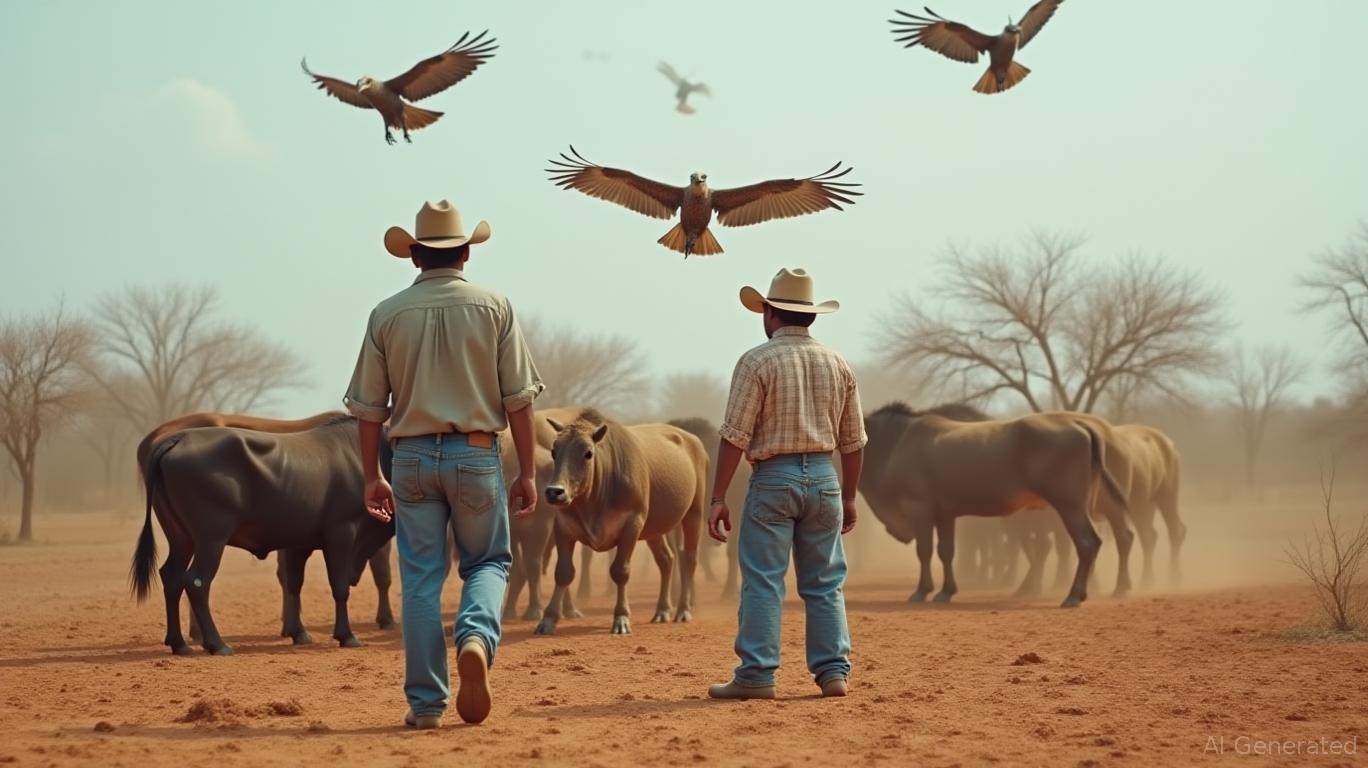Climate change drives an increase in vultures, leaving cattle ranchers without any safe haven
- U.S. cattle farmers face growing threats from northward-migrating black vultures, protected under the Migratory Bird Treaty Act, which attack calves and disrupt operations. - Climate change and human activity enable vultures to thrive in colder regions, exploiting roadkill, farms, and suburban sprawl for reliable food sources. - Farmers employ non-lethal deterrents like adjusted calving schedules and vulture effigies, but legal protections limit population control options. - Experts warn of escalating hu
American cattle ranchers are facing a growing challenge from black vultures, a federally protected species that is rapidly moving northward as a result of climate change and human expansion. Previously limited to the southeastern United States and parts of Latin America, these birds are now attacking young livestock and interfering with farm routines, leaving ranchers struggling to cope. Andrew Farnsworth, a visiting researcher at the Cornell Lab of Ornithology, noted that milder winters and shifting habitats have allowed black vultures to flourish in areas that were once inhospitable. "They excel at locating food and remembering those locations," he explained, pointing out that roadkill, cattle operations, and suburban growth have all boosted their food supply, according to
The fact that black vultures do not migrate seasonally makes the issue worse. Unlike many birds that travel with the seasons, black vultures settle and breed in new areas, establishing permanent populations. This has left ranchers like Tom Karr from Pomeroy, Ohio, with no escape. Ten years ago, Karr lost a calf to vultures and changed his calving season to later in the year, only to discover the birds stayed all year long. "They basically eat them alive," Karr said, describing the persistent threat. Joanie Grimes, who farms in Hillsboro, Ohio, has also changed her approach, keeping newborn calves close to barns for several days to reduce risk. "We've been dealing with these birds for 15 years, but keeping calves out of distant fields has made a difference," she told the AP.

The northward spread of black vultures is closely linked to larger environmental changes. Milder winters caused by climate change have enabled these birds to move into northern states. At the same time, human activities have created plentiful food sources, Farnsworth explained. Suburban expansion leads to more roadkill, and predictable cattle birthing seasons offer steady meals. The birds’ intelligence and ability to learn from each other make the problem worse, as groups of vultures share information about where to find food.
To keep the birds at bay, farmers are trying a variety of tactics. Annette Ericksen, who runs Twin Maples Farm in Milton, West Virginia, said she has not lost any animals to vultures but has kept a close eye on them for years. In some places, farmers are experimenting with fake vulture decoys and adjusting grazing patterns. Still, these efforts only provide limited relief. Because black vultures are protected under the Migratory Bird Treaty Act, lethal control is restricted, forcing ranchers to rely on non-lethal deterrents.
This situation underscores the unexpected effects of climate-related ecological changes. As black vultures continue to move north, cattle producers in the U.S. are under increasing pressure to find new ways to coexist. Experts caution that unless broader solutions—such as targeted habitat management or regulatory changes—are implemented, tensions between ranchers and these adaptable birds are likely to grow.
Disclaimer: The content of this article solely reflects the author's opinion and does not represent the platform in any capacity. This article is not intended to serve as a reference for making investment decisions.
You may also like
Romania Prohibits Polymarket: Authorities Enforce Restrictions on Cryptocurrency Betting
- Romania banned Polymarket, a blockchain-based prediction market, for unlicensed gambling during elections, citing legal violations. - Global regulators in the U.S., France, and others have also restricted Polymarket, with the U.S. imposing a $1.4M fine in 2022. - Despite bans, Polymarket secured a $2B investment from ICE in 2025 and plans a regulated U.S. relaunch by late 2025. - Regulators warn unlicensed "counterparty betting" risks money laundering and erodes oversight, emphasizing legal compliance ov

U.S. Court Case Puts DeFi to the Test: Will Regulation Hinder Innovation?
- U.S. prosecutors challenge DeFi's "honest validator theory" in a $25M MEV bot trial, arguing blockchain loopholes enable market manipulation. - MEV bots exploit transaction ordering to siphon profits from traders, deterring institutional adoption due to manipulation risks. - A ruling against defendants could force stricter MEV regulations, reshaping DeFi protocols and global crypto compliance standards. - Institutional hesitation persists despite Bitcoin/Ethereum collateral moves, as MEV risks and regula

Romania References Blockchain as a Cover for Unlawful Gambling, Adds Polymarket to Blacklist
Solana News Today: Crypto Investors Consider Presale Buzz Against Established Reliability Amid 2025's Unpredictable Market
- La Culex ($CULEX), an Ethereum-based meme coin, offers a presale with a 16.8% ROI and projected 300x returns via viral marketing and token burns, per Digital Journal. - Bitcoin Cash (BCH) trades at $553.42 with $11B market cap, showing consolidation near $549-$570 resistance levels and 6.23% daily trading volume share. - Solana (SOL) maintains $102.49B market cap at $186.40, leveraging 3,000 TPS hybrid PoH/PoS tech and institutional partnerships despite recent $188M whale outflows. - Market strategies ba
